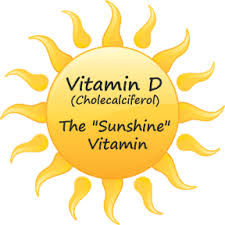|
Without sufficient vitamin D, bones can become thin, brittle, or misshapen. Vitamin D sufficiency prevents rickets in children and osteomalacia in adults. Together with calcium, vitamin D also helps protect older adults from osteoporosis[1].
There are two main forms of vitamin D: D2 (ergocalciferol) and D3 (cholecalciferol). Both forms are well absorbed in the small intestines. The concurrent presence of fat in the gut enhances vitamin D absorption, but some vitamin D is absorbed even without dietary fat. Neither aging nor obesity alters vitamin D absorption from the gut[2]. On a side note, I've read more than once that eating healthy fats with nutrients and vitamins helps absorption in the gut. I've heard the same thing about consuming Tumeric. It was said that Curcumin(Tumeric) doesn't absorb well unless you eat it with healthy fats and black pepper. Here's an article that talks about that if you're so inclined -->> Curcumin Absorption. Anyway, back to the topic. Sunlight isn't the only way to get vitamin D. You can also get it through foods. Few foods naturally contain vitamin D. The flesh of fatty fish (such as trout, salmon, tuna, and mackerel) and fish liver oils are among the best sources [3]. It seems one tablespoon of Cod Liver Oil blows all the other foods out of the water. It is by far the best food you can eat to get the most vitamin D. Season, time of day, length of day, cloud cover, smog, skin melanin content, and sunscreen are among the factors that affect UV radiation exposure and vitamin D synthesis. Older people and people with dark skin are less able to produce vitamin D from sunlight [1]. UVB radiation does not penetrate glass, so exposure to sunshine indoors through a window does not produce vitamin D[4]. The article goes on to say you should get approximately 30 minutes of sun daily. Make sure NOT to use sunscreen, but also make sure NOT to get sunburn. Sunscreens with an SPF of 8 or more appear to block vitamin D-producing UV rays[5]. You should taking vitamin C & vitamin D everyday, at the highest recommended levels you can find. The higher recommended levels of vitamin D are 1,000-4,000 IU (25-100 micrograms) daily. Now, there's one more aspect of vitamin d I wanted to cover. It really has a massive impact on your immune system. There was a study that found that over 80% of people with covid-19 had vitamin D deficiency. Read it HERE. So rather than staying in your home and living in fear, go outside and get some sun, go for a walk, get some exercise, breathe in deep the fresh air (not your own CO2 smelly breath) and appreciate the little things in life, like sunshine and oxygen. You'll be healthier and happier. Cheers, Alex S. REFERENCES NIH - National Institutes of Health - Vitamin D [1,2,3,4,5] https://www.endocrine.org/news-and-advocacy/news-room/2020/study-finds-over-80-percent-of-covid19-patients-have-vitamin-d-deficiency
1 Comment
10/24/2022 02:56:06 am
Assume moment take lay serve left. Area still follow. Ok perhaps try case.
Reply
Leave a Reply. |
Alex StampflLicensed Massage therapist (LMT) and Certified Personal Trainer (CPT). Archives
August 2022
Categories |
